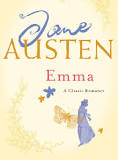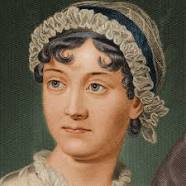Emma Page #30
Emma, by Jane Austen, is a novel about youthful hubris and the perils of misconstrued romance. The story takes place in the fictional village of Highbury and the surrounding estates of Hartfield, Randalls, and Donwell Abbey and involves the relationships among individuals in those locations consisting of "3 or 4 families in a country village". The novel was first published in December 1815 while the author was alive, with its title page listing a publication date of 1816. As in her other novels, Austen explores the concerns and difficulties of genteel women living in Georgian–Regency England; she also creates a lively comedy of manners among her characters and depicts issues of marriage, gender, age, and social status.
“Yes--I imagined--that is--I did not--” “He has been used to her in these complaints, and I hope to-morrow morning will bring us both a more comfortable report. But it is impossible not to feel uneasiness. Such a sad loss to our party to-day!” “Dreadful!--Exactly so, indeed.--She will be missed every moment.” This was very proper; the sigh which accompanied it was really estimable; but it should have lasted longer. Emma was rather in dismay when only half a minute afterwards he began to speak of other things, and in a voice of the greatest alacrity and enjoyment. “What an excellent device,” said he, “the use of a sheepskin for carriages. How very comfortable they make it;--impossible to feel cold with such precautions. The contrivances of modern days indeed have rendered a gentleman's carriage perfectly complete. One is so fenced and guarded from the weather, that not a breath of air can find its way unpermitted. Weather becomes absolutely of no consequence. It is a very cold afternoon--but in this carriage we know nothing of the matter.--Ha! snows a little I see.” “Yes,” said John Knightley, “and I think we shall have a good deal of it.” “Christmas weather,” observed Mr. Elton. “Quite seasonable; and extremely fortunate we may think ourselves that it did not begin yesterday, and prevent this day's party, which it might very possibly have done, for Mr. Woodhouse would hardly have ventured had there been much snow on the ground; but now it is of no consequence. This is quite the season indeed for friendly meetings. At Christmas every body invites their friends about them, and people think little of even the worst weather. I was snowed up at a friend's house once for a week. Nothing could be pleasanter. I went for only one night, and could not get away till that very day se'nnight.” Mr. John Knightley looked as if he did not comprehend the pleasure, but said only, coolly, “I cannot wish to be snowed up a week at Randalls.” At another time Emma might have been amused, but she was too much astonished now at Mr. Elton's spirits for other feelings. Harriet seemed quite forgotten in the expectation of a pleasant party. “We are sure of excellent fires,” continued he, “and every thing in the greatest comfort. Charming people, Mr. and Mrs. Weston;--Mrs. Weston indeed is much beyond praise, and he is exactly what one values, so hospitable, and so fond of society;--it will be a small party, but where small parties are select, they are perhaps the most agreeable of any. Mr. Weston's dining-room does not accommodate more than ten comfortably; and for my part, I would rather, under such circumstances, fall short by two than exceed by two. I think you will agree with me, (turning with a soft air to Emma,) I think I shall certainly have your approbation, though Mr. Knightley perhaps, from being used to the large parties of London, may not quite enter into our feelings.” “I know nothing of the large parties of London, sir--I never dine with any body.” “Indeed! (in a tone of wonder and pity,) I had no idea that the law had been so great a slavery. Well, sir, the time must come when you will be paid for all this, when you will have little labour and great enjoyment.” “My first enjoyment,” replied John Knightley, as they passed through the sweep-gate, “will be to find myself safe at Hartfield again.” CHAPTER XIV Some change of countenance was necessary for each gentleman as they walked into Mrs. Weston's drawing-room;--Mr. Elton must compose his joyous looks, and Mr. John Knightley disperse his ill-humour. Mr. Elton must smile less, and Mr. John Knightley more, to fit them for the place.--Emma only might be as nature prompted, and shew herself just as happy as she was. To her it was real enjoyment to be with the Westons. Mr. Weston was a great favourite, and there was not a creature in the world to whom she spoke with such unreserve, as to his wife; not any one, to whom she related with such conviction of being listened to and understood, of being always interesting and always intelligible, the little affairs, arrangements, perplexities, and pleasures of her father and herself. She could tell nothing of Hartfield, in which Mrs. Weston had not a lively concern; and half an hour's uninterrupted communication of all those little matters on which the daily happiness of private life depends, was one of the first gratifications of each. This was a pleasure which perhaps the whole day's visit might not afford, which certainly did not belong to the present half-hour; but the very sight of Mrs. Weston, her smile, her touch, her voice was grateful to Emma, and she determined to think as little as possible of Mr. Elton's oddities, or of any thing else unpleasant, and enjoy all that was enjoyable to the utmost. The misfortune of Harriet's cold had been pretty well gone through before her arrival. Mr. Woodhouse had been safely seated long enough to give the history of it, besides all the history of his own and Isabella's coming, and of Emma's being to follow, and had indeed just got to the end of his satisfaction that James should come and see his daughter, when the others appeared, and Mrs. Weston, who had been almost wholly engrossed by her attentions to him, was able to turn away and welcome her dear Emma. Emma's project of forgetting Mr. Elton for a while made her rather sorry to find, when they had all taken their places, that he was close to her. The difficulty was great of driving his strange insensibility towards Harriet, from her mind, while he not only sat at her elbow, but was continually obtruding his happy countenance on her notice, and solicitously addressing her upon every occasion. Instead of forgetting him, his behaviour was such that she could not avoid the internal suggestion of “Can it really be as my brother imagined? can it be possible for this man to be beginning to transfer his affections from Harriet to me?--Absurd and insufferable!”--Yet he would be so anxious for her being perfectly warm, would be so interested about her father, and so delighted with Mrs. Weston; and at last would begin admiring her drawings with so much zeal and so little knowledge as seemed terribly like a would-be lover, and made it some effort with her to preserve her good manners. For her own sake she could not be rude; and for Harriet's, in the hope that all would yet turn out right, she was even positively civil; but it was an effort; especially as something was going on amongst the others, in the most overpowering period of Mr. Elton's nonsense, which she particularly wished to listen to. She heard enough to know that Mr. Weston was giving some information about his son; she heard the words “my son,” and “Frank,” and “my son,” repeated several times over; and, from a few other half-syllables very much suspected that he was announcing an early visit from his son; but before she could quiet Mr. Elton, the subject was so completely past that any reviving question from her would have been awkward.
Translation
Translate and read this book in other languages:
Select another language:
- - Select -
- 简体中文 (Chinese - Simplified)
- 繁體中文 (Chinese - Traditional)
- Español (Spanish)
- Esperanto (Esperanto)
- 日本語 (Japanese)
- Português (Portuguese)
- Deutsch (German)
- العربية (Arabic)
- Français (French)
- Русский (Russian)
- ಕನ್ನಡ (Kannada)
- 한국어 (Korean)
- עברית (Hebrew)
- Gaeilge (Irish)
- Українська (Ukrainian)
- اردو (Urdu)
- Magyar (Hungarian)
- मानक हिन्दी (Hindi)
- Indonesia (Indonesian)
- Italiano (Italian)
- தமிழ் (Tamil)
- Türkçe (Turkish)
- తెలుగు (Telugu)
- ภาษาไทย (Thai)
- Tiếng Việt (Vietnamese)
- Čeština (Czech)
- Polski (Polish)
- Bahasa Indonesia (Indonesian)
- Românește (Romanian)
- Nederlands (Dutch)
- Ελληνικά (Greek)
- Latinum (Latin)
- Svenska (Swedish)
- Dansk (Danish)
- Suomi (Finnish)
- فارسی (Persian)
- ייִדיש (Yiddish)
- հայերեն (Armenian)
- Norsk (Norwegian)
- English (English)
Citation
Use the citation below to add this book to your bibliography:
Style:MLAChicagoAPA
"Emma Books." Literature.com. STANDS4 LLC, 2025. Web. 10 Jan. 2025. <https://www.literature.com/book/emma_29>.




Discuss this Emma book with the community:
Report Comment
We're doing our best to make sure our content is useful, accurate and safe.
If by any chance you spot an inappropriate comment while navigating through our website please use this form to let us know, and we'll take care of it shortly.
Attachment
You need to be logged in to favorite.
Log In